- Home
- Lynne Reid Banks
Two Is Lonely Page 10
Two Is Lonely Read online
Page 10
‘Why not?’
‘What do you want to go to Israel for, of all places?’
‘There’s someone there I want to see.’
‘What’s his name?’
‘Toby Cohen.’
‘Have I heard about him?’
‘I think I mentioned him to you once, ages ago.’ I paused, and added, ‘Maybe you know the name. He writes novels.’
‘Oh yes! Didn’t he write A Hole in the Wall? I liked that very much. Here, wait a minute . . .’ she said suddenly. ‘The girl in it—what was her name—’
‘Greta—’
‘That’s it! I remember as I read it thinking she reminded me of you. Well. Am I on the right track?’
‘Mummy, we’ve been walking round and round for AGES, you’re not watching!’
‘Sorry, love—from a walk to a canter—shorten reins—NOW. Oh, very good, Miss Barclay!’
‘David, you’re still trotting.’
‘Bee’s so damn fat.’
‘Whack her on the rump,’ suggested the successful Amanda, cantering round and lapping him.
‘All right, back to trot—Amanda reverse—meet at the top and go in pairs down the middle. So you want to go to Israel to see him. Before you can decide about Andy.’
‘Yes.’
‘Ah ha. But surely you’d be mad to go just now?’
‘Why not?’
Jo stared at me, hands on small hips, comically amazed.
‘My dear old duck, where do you live? Don’t you listen to the news? There’s going to be a war out there at any moment.’
I watched David and Amanda trotting sedately down the field towards us and then stepped aside to let them pass. I drew in a deep breath as they went by, and realised I hadn’t breathed for about a minute.
‘What sort of a war?’
‘A fairly murderous sort, to hear the BBC tell it. Egyptian tanks massing by the hundreds in Sinai, U.N. pulling out at any moment to let them have a go at each other . . . Oh Jesus, don’t look like that! Do you care that much? Listen, you can’t go just now, what about David if anything broke out and you couldn’t get back? It’d be completely—’
‘Selfish—’
‘Irresponsible, I was about to say. Same thing.’
‘Yes.’ I was silent for some moments, and then said, ‘But Toby’s got his little daughter out there. Surely he won’t keep her there if things are really dangerous.’
‘Well, listen to the news a few times, watch the preparations going on every night on telly. They’re going to massacre each other. I mean, I don’t care much, one way or the other, let them have it out and settle it, I say—better than going on for another 20 years snapping and snarling at each other. But then I don’t know anyone out there on either side, or I might feel different.’
I looked at my watch. There’d be a news bulletin in a few minutes. ‘Will you hold the fort out here?’
‘Sure . . . Jane, listen . . .’
‘What?’
‘If you decide to go, you might look at some of the embroidery and filigree silver stuff the Yemenite immigrants do, I hear it’s very nice. Only it’d have to be better than the tat they flog in the Israel Shop in London. None of those nasty green metal vases and olive-wood holy land camels . . .’
I sat in Jo’s double-ended living-room and listened to the news on the radio. As I listened, with my blood chilling at every sentence, I felt bemused that I hadn’t heard a word about all this before. After all, I have a radio too—but I seldom turn it on except for concerts and the occasional play, and as for newspapers I always start in the middle and work back towards the front page, but lately I’d hardly ever got there somehow. This is part of the penalty—or beauty—of country life. Everything around you is so peaceful that it seems no wars can exist anywhere—at least, none that concern you. Now a dark shadow of alarm fell over my self-contained little world, for I saw that Toby and Rachel, wherever in Israel they might be, were in appalling danger.
I found an atlas among Amanda’s school books and for the first time since my own school days had a close look at the Middle East. What I saw terrified me. Israel lay like a pointed thorn, a gnome’s dagger, sticking into the side of a vast hostile territory. The tip of my finger, anxiously probing the map, covered Israel, while my whole fist hardly extinguished the furthest borders of her enemies. ‘It’s hopeless!’ I thought. ‘An absurdity. Why doesn’t he come home?’
And then I suddenly thought that perhaps he had. That letter, so recent to me, was written some time ago. Probably he’d returned even before this crisis started. The strain of not knowing was so great that it overcame all my inhibitions. I picked up Jo’s phone on the spot and rang Billie’s home number.
‘Hallo? Billie? It’s Jane Graham.’
‘Hallo my dear! I’ve been meaning to get in touch. You got my letter?’
‘Yes. Listen, Billie. Is he back?’
‘Of course you’re worried. My dear, so are we. You can imagine. I mean it’s bad enough him being out there, but Rachel—! I don’t know how many telegrams I’ve sent already telling him to bring her home, or if he must stay himself, to send her. All I get in reply is “All quiet here don’t worry”.’
‘You mean he’s not coming back?’
‘It doesn’t look like it.’ Was I deceived, or was there a note of satisfaction in her voice?
‘But why not? I don’t understand—there’s going to be a war.’
‘Well, that’s not absolutely certain yet, though things look very bad of course. Very bad.’
‘So why doesn’t he come, Billie? For God’s sake?’
‘Hard to explain.’
‘But you understand,’ I said slowly.
‘Oh yes. He’s a Jew, after all. And he’s a man. And I doubt if there are many Jewish men of army age in the world at this moment who aren’t a little troubled in their minds as to where they ought to be. I’m a woman, and I’m nearly fifty, and I’ve never been noticeably Jewish in anything but looks, yet even I . . .’ There was an oddly emotional silence, which I broke into impatiently.
‘But the child!’
‘Oh God, yes, he should send Rachel home, I’ve told him that, and Melissa’s nearly out of her mind. Melissa phoned him at the kibbutz. She begged him. Do you know what he said? He said that nobody’s sending their children out, and he can’t be the first and only one. When she didn’t accept that, he said that he was fairly sure that there wouldn’t be a war, and that if there were, he was even surer that the Israelis would win it.’
‘They can’t possibly. I mean look at the map. They can’t possibly.’
‘We must hope you’re wrong about that,’ she said with a sudden slight coldness.
‘Oh Billie, stop that! I know you’re a Jew and you probably believe deep down that God’ll protect his people and all that, but just look at the population figures. They’re outnumbered something like 40 to one. No country can survive against odds like that.’
There was a pause and then Billie said in a strange, withdrawn tone, ‘Toby says they can, and Toby’s there. Everything about that country happened at odds-on.’
‘Can’t Melissa go over herself and bring Rachel back? Take the matter out of Toby’s hands?’
‘She would, she wants to. But I won’t let her.’
‘Why not?’
After another pause, she said, ‘Because I’m afraid that if she went out there she wouldn’t come back either.’
I almost physically threw up my hands. ‘Good grief, is she crazy too?’
‘It’s what I’d do myself.’ She laughed a little. ‘All we Jews are a bit crazy just now. Haven’t you seen the fund-raising rallies on TV? Tight-fisted hard-headed businessmen giving millions away at the drop of a yarmulka.’ She laughed again, exultantly, and suddenly said, ‘We’ll beat them, Jane—we’ll beat them, with or without God, you’ll see.’
I made a sound of exasperation.
‘Billie, listen to me. I know you’ll say it’s none
of my business—’
‘Oh no I won’t,’ she said, sounding quite sober and calm again.
‘I can’t go into it all now, but I simply have to see Toby. I can’t move, somehow, in any direction until I’ve seen him. Now what if—’ I hesitated only a moment, but it was too complicated to think out, so I went on impulsively—’what if I went out there, very soon, I mean in the next few days. On my own private business with him. Is there anything you want me to say or do about Rachel?’
There was a long silence, so long that I asked if she were still there.
‘Yes, I’m here. I’m thinking. You won’t be going for a day or two anyway, will you?’
‘No,’ I said, suddenly getting frightened. Was I really going then?
‘So I’ll maybe talk to Melissa and let you know.’
‘You’re going to tell Melissa about me?’
‘My dear, don’t you think she knows all about you? She once told me you were breaking up her marriage by remote control.’ And on that stunning note, she said goodbye.
Chapter 7
LET me come with you, Mummy! Please, please let me come! I won’t be in the way, Mummy, please, don’t leave me behind—’
I was sitting on a bank of damp velvet turf under an oak tree. David, small, compact in his riding clothes, clutching his little crop, jodhpur’d legs bent into a crouch as if he were about to jump on top of me and pin me to the ground, was standing in front of me. His usually alert but placid face was twisted into a flaming mask of passionate beseeching.
Behind him I could see the crowds and the railing round the show-ring, hear the prrrmph of horses sneezing in the damp air. It was a cloudy day. The children, the mothers and fathers and baby brothers and sisters, were bundled up in tweeds and flannels. Picnics were mostly being eaten in cars, which were dotted everywhere among the trees of the large paddock where the gymkhana was being held. There was a tent for refreshments which was used for every outdoor community occasion; it leaked, and had done for years, usually straight into the cups of tea, but it was not yet actually raining, so everybody was cheerful and all the kids and ponies and family dogs and relations were having a good time.
David had begun the day well by coming in third in the junior riding class. His first rosette, a beautiful yellow-streamered symbol of triumph, now fluttered from Bee’s bridle. He had been so excited (the more so, perhaps, since Amanda had not been placed and it was the first time he had ever beaten her in anything) that I had had to put a hand on his shoulder after about five minutes of bouncing to restrain him from exhausting all the energy he would need—as I explained—to get a red or even a blue rosette in subsequent events.
Now it was the turn of the 12—16 year olds, and for three or four events David and Amm had nothing to do except watch, groom their ponies, eat sandwiches and mess around with their contemporaries. Only Amm wasn’t feeling her usual ebullient self after her humiliation and David, on the other hand, was in such wonderful spirits that they hardly matched; so David came and sat with me under the oak tree where I’d established myself with the picnic basket, preferring damp outdoors to cramped car, and ate a snack and talked excitedly on and on about his win while I remained silent and preoccupied by my own gnawing inward concerns.
I decided that this would be the moment to tell David I was going abroad. I didn’t know whether to expect any trouble about it. I’d been away several times before, on business trips, and the arrangement was a standing one—David went to Jo’s and slept in Amanda’s room and had a wonderful time. It was half his home anyway, Jo was like the closest sort of aunt, and Amm was his sister in all but fact; his routine was scarcely disturbed, and if he’d missed me (which he sometimes had) it was not too intensely or for long, since I’d never been away longer than a week at a time.
Of course this had been before his ‘nights’ started. Nevertheless his abrupt and violent reaction to my casual announcement this time caught me completely off-balance.
‘Darling, what is it? You’ve never wanted to come before.’
‘I want to this time. I don’t want to stay with Amm, I want to come with you. I won’t let you go if you don’t take me, I won’t let you!’ His tone was almost hysterical. I reached up, caught him round the waist, and pulled him down onto the grass between my knees.
‘I don’t understand this, David. What’s different about this time?’
His body was rigid in my arms, as it had been the other day when we had had the outburst about Terry. He turned his face away, struggling not to cry.
‘You’ve spoilt everything,’ he said in a hard little voice I didn’t recognise. ‘I was happy and you’ve spoilt it. I don’t want you to go.’ He tried to pull away from me, but I held him.
‘Listen, I’m going on business. It’s not a treat or a holiday, like when we all went to Spain. I wouldn’t know what to do with you, David. I can’t take you, you’d be bored and miserable while I was seeing people.’
‘I could come with you. I could sit quiet and wait for you. Then when you’d done all the business we could see things. Israel’s where Jesus was born and all that, isn’t it?’ The sulky tone was muted now, and the pleading note had come back. He looked at me from under his eyelids. His expression mixed desperation with a kind of craftiness. ‘I’d learn a lot,’ he said slyly. ‘I could write some good news-pieces.’ He knows I greatly approve of the emphasis on free writing in his school.
For a moment I let myself play with the idea. But that morning’s news bulletin was still fresh in my mind. The Americans were holding the Israelis back at the moment from launching what I’d already, in 24 hours of belated interest, learnt to call ‘a pre-emptive strike’. A sort of calm had fallen on the situation—some commentators were calling it a false calm, others seemed genuinely optimistic that a war could still be avoided.
‘Listen though, David—’
No. Mustn’t tell him there’s any danger. That’s all he needs. I looked at his face, and it was not the face I knew. The desperation, the terror on it were estranging; it was his night-face, not his day-face, and here in the open air, surrounded by the thumping normality of tweeds, ponies and picnics, it struck a note of eerie unreality, as if his own personality were somehow becoming twisted. I had felt this sometimes, terrifyingly, in the nights. But this was different. Was his unreachable, not-normal night-self beginning to encroach on the days? I suddenly clutched him against me in a spasm of anxiety.
‘All right, I won’t go,’ I said out of a dry mouth.
He didn’t answer. But his arms went round my waist and he squeezed with his full strength, straining his head and body against me. Then he disengaged himself and jumped up.
‘Aunty Jo can go instead. We’ll have Amm to stay with us. We’ll be extremely good, Mummy. I promise.’
He looked down at me a moment, flushed, his breath coming in noisy gasps. Then he ran off hard towards the show-ring.
I sat still for a few minutes, shaken by something I didn’t quite understand. I had reversed my strongest intention on a whim of David’s. Ten minutes ago I wouldn’t have believed anything could change my mind about going. I thought it was something I really had to do. But David, by one change of expression, by one note in his voice higher on the falsetto scale than usual, had swayed me, set me into reverse. This had never happened before.
Before, I had always made decisions to the basis of what I wanted to do. Usually I wanted to do what I thought would be best for David so there was no conflict. But undeniably, I had never before made a sacrifice for him.
I thought of Addy, my great-aunt, who had left me the cottage. Addy never made sacrifices. It was against her principals. But then, she had never had children of her own. I had always admired her way, believing with her that sacrifices, in the end, undermine and destroy a relationship. But now I saw it was not so simple. I would have needed a streak of utter ruthlessness to have denied David’s imperative appeal.
But what of my own needs? Balked of the chance to see
Toby, the desire to do so was immediately trebled.
I got up slowly and stiffly and wove in and out of the parked cars till I got to Jo’s. It was a station-wagon like mine, only a lot grander and more comfortable. The back of it was quite caravan-like. Amanda, looking depressed to the point of sulks, and Jo were sitting in there propped up by numerous harem-cushions feasting off cold roast duck and game-chips. Jo saw me coming and waved a bottle of wine at me invitingly. Then her smile altered and she got out quickly and came to meet me.
‘Now what? You look like the kiss of death.’
‘Kids . . .’ I said hopelessly, spreading my hands.
‘Are you telling me? I could personally do David in for beating Amanda, even though from a strictly objective point of view I know it’s the best thing that could have happened . . .’ She watched me with narrowed eyes. ‘Well, what? Has he said you mustn’t go?’
I nodded, feeling vaguely ashamed. Jo was a strong believer in not letting children rule one’s life. I feared she’d think me very malleable and weak-kneed for giving in to him. But, not unusually, Jo surprised me.
‘As it so happens, he’s a hundred per cent right on this occasion, though probably for all the wrong reasons. I also think you mustn’t go. Children have queer instincts. Maybe he senses you’d be taking risks. Risks you’ve no right to take, as I think I mentioned.’ She paused, and then added, ‘You’re all he has.’
I said nothing, staring bleakly out through the grey, waterlogged air. ‘But what shall I do?’ I muttered after a moment. ‘I’m in such a mess. I don’t know what to do next.’
‘For a start, come in and have a drink.’
‘No thanks, not just now.’
‘Like that, is it?’
It was seven years since Jo had encountered a problem towards the solution of which a drink was not the first natural step. Though neither of us ever got drunk, this was true of me, too—a drink, usually of wine, calmed me, helped me to get the problem into perspective. But when things were very bad, the taking of this first step seemed to trivialise rather than help. It had been like that for Jo when Ted died—for months she hadn’t drunk anything. ‘I have to feel all of this,’ she had said. ‘I owe it to him.’ I felt that now, though my trouble was not grief. I simply felt this was a turning-point so fundamental that drinking as an aid to a decision was somehow belittling and insulting.

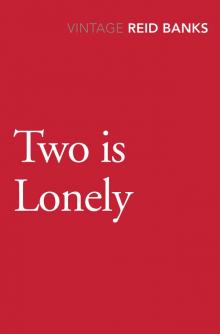 Two Is Lonely
Two Is Lonely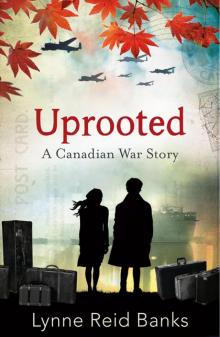 Uprooted - a Canadian War Story
Uprooted - a Canadian War Story The Backward Shadow
The Backward Shadow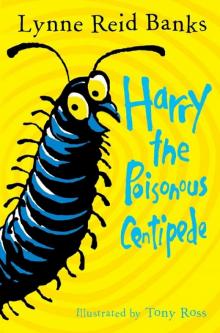 Harry the Poisonous Centipede: A Story to Make You Squirm
Harry the Poisonous Centipede: A Story to Make You Squirm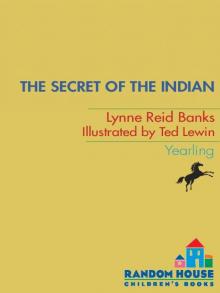 The Secret of the Indian (The Indian in the Cupboard)
The Secret of the Indian (The Indian in the Cupboard)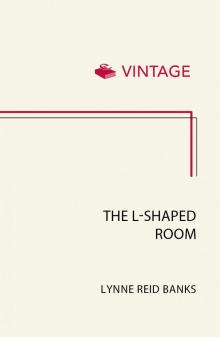 The L-Shaped Room
The L-Shaped Room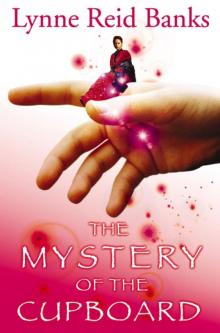 The Mystery of the Cupboard
The Mystery of the Cupboard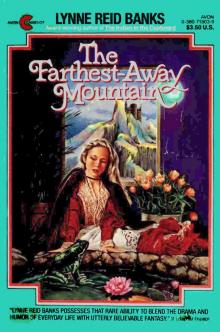 The Farthest-Away Mountain
The Farthest-Away Mountain Harry the Poisonous Centipede Goes to Sea
Harry the Poisonous Centipede Goes to Sea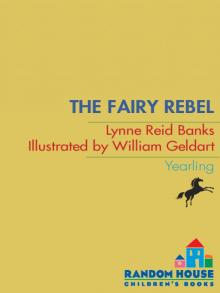 The Fairy Rebel
The Fairy Rebel Harry the Poisonous Centipede's Big Adventure: Another Story to Make You Squirm
Harry the Poisonous Centipede's Big Adventure: Another Story to Make You Squirm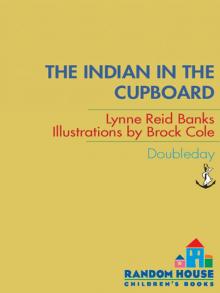 The Indian in the Cupboard
The Indian in the Cupboard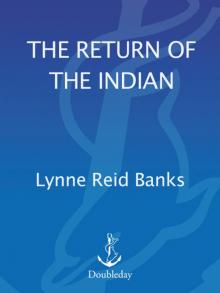 The Return of the Indian
The Return of the Indian I, Houdini
I, Houdini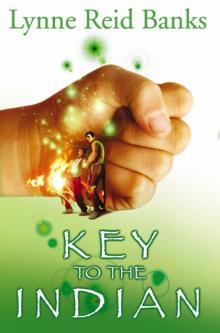 The Key to the Indian
The Key to the Indian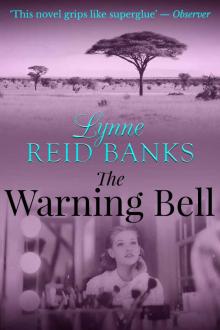 The Warning Bell
The Warning Bell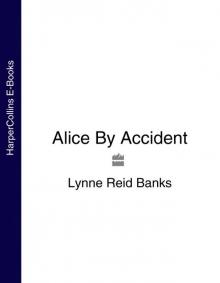 Alice by Accident
Alice by Accident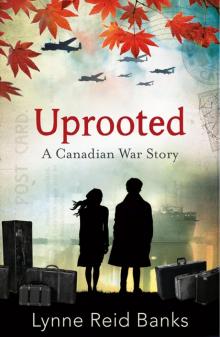 Uprooted
Uprooted Writing On the Wall
Writing On the Wall The Adventures of King Midas (Red Storybook)
The Adventures of King Midas (Red Storybook) Harry the Poisonous Centipede's Big Adventure
Harry the Poisonous Centipede's Big Adventure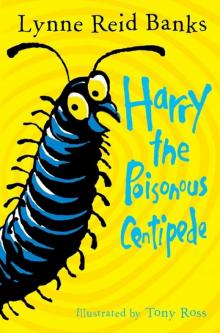 Harry the Poisonous Centipede
Harry the Poisonous Centipede The Dungeon
The Dungeon Bad Cat, Good Cat
Bad Cat, Good Cat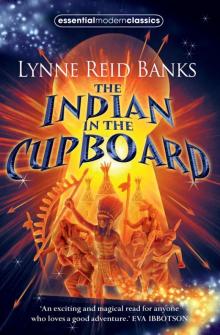 The Indian in the Cupboard (Essential Modern Classics, Book 1)
The Indian in the Cupboard (Essential Modern Classics, Book 1) Tiger, Tiger
Tiger, Tiger